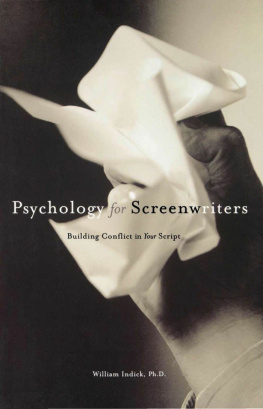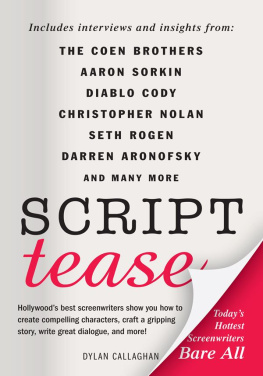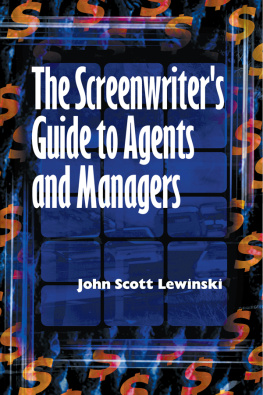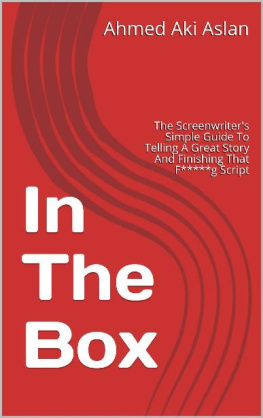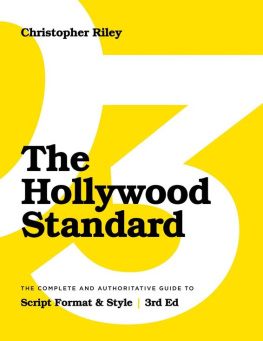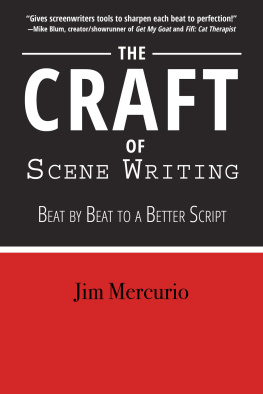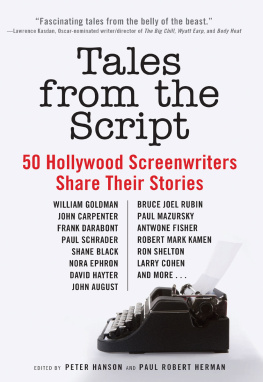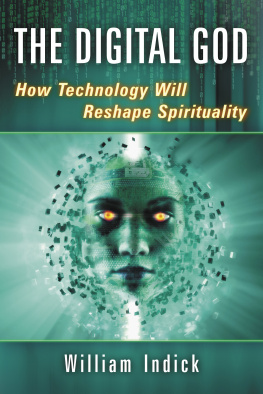William Indick - Psychology for screenwriters: building conflict in your script
Here you can read online William Indick - Psychology for screenwriters: building conflict in your script full text of the book (entire story) in english for free. Download pdf and epub, get meaning, cover and reviews about this ebook. year: 2004, publisher: Michael Wiese Productions, genre: Children. Description of the work, (preface) as well as reviews are available. Best literature library LitArk.com created for fans of good reading and offers a wide selection of genres:
Romance novel
Science fiction
Adventure
Detective
Science
History
Home and family
Prose
Art
Politics
Computer
Non-fiction
Religion
Business
Children
Humor
Choose a favorite category and find really read worthwhile books. Enjoy immersion in the world of imagination, feel the emotions of the characters or learn something new for yourself, make an fascinating discovery.
- Book:Psychology for screenwriters: building conflict in your script
- Author:
- Publisher:Michael Wiese Productions
- Genre:
- Year:2004
- Rating:5 / 5
- Favourites:Add to favourites
- Your mark:
- 100
- 1
- 2
- 3
- 4
- 5
Psychology for screenwriters: building conflict in your script: summary, description and annotation
We offer to read an annotation, description, summary or preface (depends on what the author of the book "Psychology for screenwriters: building conflict in your script" wrote himself). If you haven't found the necessary information about the book — write in the comments, we will try to find it.
William Indick: author's other books
Who wrote Psychology for screenwriters: building conflict in your script? Find out the surname, the name of the author of the book and a list of all author's works by series.
Psychology for screenwriters: building conflict in your script — read online for free the complete book (whole text) full work
Below is the text of the book, divided by pages. System saving the place of the last page read, allows you to conveniently read the book "Psychology for screenwriters: building conflict in your script" online for free, without having to search again every time where you left off. Put a bookmark, and you can go to the page where you finished reading at any time.
Font size:
Interval:
Bookmark:

While Dr. Indick focuses on facilitating the process of screenwriting, anyone who likes movies will find his analysis of the psychology behind the plot and characters to be a treat. Screenwriters, filmmakers, psychologists, and film enthusiasts alike will find his book engaging and enlightening.
Dr. Kendell Thornton
Assistant Professor of Psychology
Dowling College
Psychology for Screenwriters: Building Conflict in Your Script is a must read for screenwriters, filmmakers, film analysts, and students of film and psychology. This book is destined to become an essential volume for all those who aspire to write a successful script or make a successful movie. Dr. Indicks treatment of complex psychological concepts, character traits, and plot lines is clear and direct. His book lends itself to immediate application in character development, portrayal, and script analysis.
Dr. Suzanne Johnson
Professor of Psychology
Author of For Lesbian Parents (Guilford Press, 2001)
and The Gay Baby Boom (New York University Press, 2002)
Dr. Indicks book is a comprehensive and insightful account of how psychological knowledge can elucidate and guide any filmmaking experience. Unquestionably, it is must-read material for screenwriters and anyone who might be interested in understanding the intricacies of storytelling in the motion picture industry.
Dr. Maura Pilotti
Assistant Professor of Psychology
Dowling College
You cannot find a clearer or more concise guide on the psychology of cinema than this book. A brilliant and insightful companion for the screenwriter and film aficionado alike, this lucid and lyric guide provides a Lets Go tour of the most powerful psycho-literary theories of our age as they apply to hundreds of great films.
Marcus C. Tye, Ph.D.
Clinical Psychologist
Associate Professor of Psychology
Dowling College
Even the most experienced writer may have misplaced the knowledge needed to right the course of a script that has lost its creative rudder or stayed too close to the surface of human conflict. Indicks book can be the trade wind that helps bring the screenwriters solitary voyage into harbor, on time and under budget.
Stuart Fischoff, Ph.D.
Screenwriter
Senior Editor, Journal of Media Psychology
Professor of Media Psychology
California State University, Los Angeles
Building Conflict in your Script
William Indick, Ph.D.
Published by Michael Wiese Productions
12400 VENTURA BLVD. #1111
Studio City, CA 91604
tel. (818) 379-8799
fax (818) 986-3408
mw@mwp.com
www.mwp.com
Cover Design: MWP
Book Layout: Gina Mansfield
Editor: Arthur G. Insana
Printed by McNaughton & Gunn, Inc., Saline, Michigan Manufactured in the United States of America
2004 William Indick
All rights reserved. No part of this book may be reproduced in any form or by any means without permission in writing from the publisher, except for the inclusion of brief quotations in a review.
Library of Congress Cataloging-in-Publication Data
Indick, William, 1971-
Psychology for screenwriters : building conflict in your script / William Indick.
p. cm.
Filmography: p.
Includes bibliographical references and index.
ISBN 0-941188-87-6
1. Motion picture authorship. 2. Motion picture authorship--Psychological aspects. I. Title.
PN1996.I53 2004
808.2'3--dc22
2004002056
For M2
The author must give much thanks to Mustafa Lokmaci, a graduate assistant in the Psychology Department at Dowling College, for compiling the filmography and subject index. Much of the information in the filmography was retrieved from the Internet Movie Database, IMDB.com. Thanks to Victoria Cook for her excellent legal advice. Much appreciation goes to Jim Garbarino at Cornell University, Suzanne Johnson at Dowling College and Frank Madden at SUNY Westchester Community College for their mentorship, guidance, and advice. A debt of gratitude is owed to the faculty and administration of Dowling College in Oakdale, New York, for their support of the authors research and writing projects. And many thanks to Michael Wiese and Ken Lee at Michael Wiese Productions for making this book possible.
Drama is life, with the dull bits cut out.
Alfred Hitchcock
In Stardust Memories (1980), Woody Allens protagonist has a death fantasy in which his psychiatrist eulogizes him, saying: he had a faulty denial mechanism he was unable to block out the harmful truths of life or, as a famous movie producer put it: People dont want to see too much reality People go to the movies to experience fantasy. While they watch the film-fantasy projected in front of them, they project their own fantasies onto the characters on the screen. The theater experience itself a dark, quiet, cavernous room is evocative of the unconscious mind. As a projection of the human imagination, film is the greatest medium of fantasy ever created.
Very early on in its existence, the Hollywood Dream Factory realized that fantasy sells. At the movies, the depths of unconscious fantasy and desire love and sex, death and destruction, fear and anger, revenge and hatred can all be indulged in safely, without risk of embarrassment and with a virtual guarantee of a happy ending. A thorough understanding of the unconscious mind the birthplace of fantasy, dreams, and imagination is a fundamental point of departure for creating psychologically resonant scripts and films.
Films visceral appeal as a larger than life medium on both visual and auditory levels makes it an extremely powerful psychological force. Viewers are literally absorbed in a movie, becoming so emotionally connected with the characters and plot that the illusion on the screen becomes intertwined with their own psychological lives. Through the unconscious process of identification, the people in the audience actually become the characters that they identify with in the film, and they experience, vicariously, the same psychological development and catharsis that the characters on the screen experience.
Movies reach deep down inside the audiences unconscious minds, affecting the way they think and feel about themselves and the world around them. A psychoanalytic approach to understanding and creating film images, characters, and stories is an invaluable resource for filmmakers and screenwriters. Audiences are not consciously aware of the subtle manipulation achieved through a films activation of their primal fears, childhood anxieties, unconscious issues, and repressed desires. Yet, they experience heightened states of arousal when viewing the film, because they are emotionally and psychologically integrated with the characters and images on the screen. By learning about the inner workings of the human mind, filmmakers and screenwriters bring more skill and depth to their craft, and create more powerful and resonant films.
The key to success in any field of endeavor whether it be teaching, writing, filmmaking, acting, etc. is to know your audience. The brilliant theories of Sigmund Freud, Erik Erikson, Carl Jung, Joseph Campbell, Maureen Murdock, Alfred Adler, and Rollo May are all designed to increase our knowledge of the human mind. Psychoanalytic theory is the study of the primary subject, aimed at what Socrates believed was the ultimate intellectual goal: To know thyself.
Font size:
Interval:
Bookmark:
Similar books «Psychology for screenwriters: building conflict in your script»
Look at similar books to Psychology for screenwriters: building conflict in your script. We have selected literature similar in name and meaning in the hope of providing readers with more options to find new, interesting, not yet read works.
Discussion, reviews of the book Psychology for screenwriters: building conflict in your script and just readers' own opinions. Leave your comments, write what you think about the work, its meaning or the main characters. Specify what exactly you liked and what you didn't like, and why you think so.

